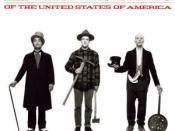GLOBAL ORGANISATION AND RATIONALISATION
Chapter
I.It is claimed that the increasing influence of extremely large MNE's has provided a threat to the ability to governments to govern. Is capitalism becoming disorganised? And how might MNE's changing our culture?
II.The USA are often accused of economic and cultural imperialism. Explain these concepts. Is there any connection between them?
III.How does Ritzer relate his theary of McDonaldisation to Weber's "iron cage" of rationality? Is "velvet cage" a more realistic description of our society?
Chapter I
Capitalism is the strive for profit of individualls within a society or economy. It is organised and protected by each government. DUDEN (1996), Kapitalismus. However, due to the globalisation process capitalism is rather organised by multinational companies nowadays. Governments which also introduced steps to accelerate the globalisation process, by liberalising the foreign trade and deregulating the domestic market, now have to suffer from the fact that companies no longer produce in western, cost intensive countries, but rather move production to developing countries where production is far more cheaper.
The performance of a country, however, is shown through the Gross Domestic Product, which contains factors such as foreign trade balance or unemployment rate. For this reason governments are depending on multinational companies and tend to fulfil companies' demands to keep them in the country. Among governments' interventions also technical improvements, such as the Internet, a drop in transportation costs and the increasing standardisation were major steps towards a growing globalisation. BERNARD VON PLATE (2000), "Grundelemente der Globalisierung", Informationen zur politischen Bildung, Globalisierung
Multinational enterprises have also a great influence on every culture by getting them to believe that they need special brands, food, music etc. In the past, for example, fashion and language were characteristic of nearly every culture. Today the same fashion is spread all over the...


